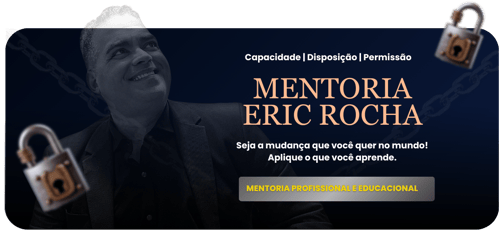Professional and Educational Mentoring
John 10:10 - "...I came that they might have life and have it abundantly."
©2025 All rights reserved - Alpha Eagle - Education, Leadership and Purpose


The Concept of Permission: Unlocking Your Full Potential
In this context, permission refers to the internal authorization that each individual grants themselves to live fully and achieve their goals. The lack of permission, on the other hand, represents an emotional blockage that prevents a person from taking action and seizing opportunities that arise.
The Two Main Factors Behind the Lack of Permission
According to the example presented, the lack of permission is intrinsically linked to two main factors:
🔹 Emotional Dependence – This refers to an excessive need for external approval and validation, making it difficult to make autonomous decisions and pursue personal goals. People with high emotional dependence tend to prioritize the needs of others over their own, which can create a feeling of "unworthiness" and make it difficult for them to give themselves permission to seek happiness.
🔹 Fear – This includes various types of fear, such as fear of failure, judgment, rejection, change, and the unknown. These fears can paralyze a person, preventing them from stepping out of their comfort zone and seeking new experiences.
How the Lack of Permission Creates an Invisible Barrier
The lack of permission manifests as an internalized "I can't", even when real opportunities exist. The person desires something but feels emotionally incapable of achieving it. This happens because the way they relate to others keeps them trapped in a web of:
❌ Fears – Insecurities and anxieties that prevent the person from taking risks and seeking new opportunities.
❌ Guilt – Feelings of inadequacy and remorse that make them believe they do not deserve happiness or success.
❌ Emotional Debts – A sense of obligation to repay favors or meet the expectations of others, even if it means sacrificing their own desires.
How the Lack of Permission Affects Capability and Willingness
As explained earlier, permission directly influences willingness, and consequently, capability. When a person does not allow themselves to take action, their willingness decreases, making it harder to develop new skills and achieve goals.
📌 Example:
Imagine someone who dreams of starting their own business but is afraid of failure and other people's opinions. This lack of permission prevents them from taking the first steps, even if they have great ideas and the necessary resources. Fear paralyzes them, weakening their willingness and, consequently, their ability to turn the dream into reality.
Overcoming the Lack of Permission
Overcoming the lack of permission is a complex process that requires self-awareness, emotional work, and, in some cases, professional guidance. Some strategies that can help include:
✅ Identifying Limiting Beliefs – Recognizing the negative thoughts and beliefs that prevent action.
✅ Questioning Fears – Analyzing the origin of fears and confronting them with real evidence.
✅ Building Self-Esteem and Self-Confidence – Strengthening belief in oneself and personal capabilities.
✅ Seeking Emotional Support – Talking to friends, family, or a mental health professional.
✅ Setting Realistic and Achievable Goals – Starting with small steps and celebrating each achievement.
Conclusion: Give Yourself Permission to Grow
Permission is the key to unlocking human potential. By freeing themselves from emotional constraints, individuals allow themselves to take action, develop their abilities, and build a more fulfilling and meaningful life.
If you feel like something is holding you back, ask yourself:
🔹 What am I waiting for to give myself permission to try?
🔹 What is the worst that could happen if I fail?
🔹 What do I gain if I take this first step?
Transformation begins the moment you decide to give yourself permission. 🚀
Understanding Permission Freeing Yourself from Emotional Ties
Premises and Pillars
Education | Leadership | Purpose




